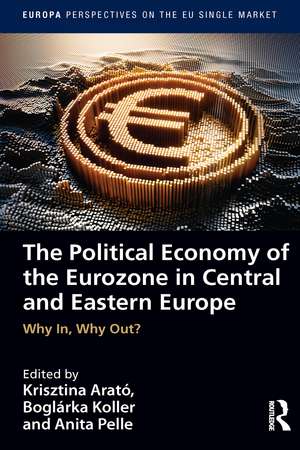The Political Economy of the Eurozone in Central and Eastern Europe: Why In, Why Out?: Europa Perspectives on the EU Single Market
Editat de Krisztina Arató, Boglarka Koller, Anita Pelleen Limba Engleză Paperback – iul 2021
The attractiveness of the currency union has nevertheless not disappeared for the CEE countries. Despite the Eurozone crisis of 2010–13, it was during that time that the Baltic states introduced the euro. Then, after a few years of inactivity, Croatia and Bulgaria successfully applied for membership of the exchange rate mechanism in July 2020, amid the economic crisis caused by the coronavirus (COVID-19) pandemic. At the same time, the three Visegrad countries still using their national currencies – Poland, Czechia and Hungary – no longer have a target date to join the monetary union. This volume aims to discuss these issues from horizontal aspects and through country studies, with contributions from expert authors from, or closely related to, the CEE region.
| Toate formatele și edițiile | Preț | Express |
|---|---|---|
| Paperback (1) | 389.29 lei 6-8 săpt. | |
| Taylor & Francis – iul 2021 | 389.29 lei 6-8 săpt. | |
| Hardback (1) | 1000.27 lei 6-8 săpt. | |
| Taylor & Francis – iul 2021 | 1000.27 lei 6-8 săpt. |
Preț: 389.29 lei
Nou
Puncte Express: 584
Preț estimativ în valută:
74.49€ • 77.98$ • 61.64£
74.49€ • 77.98$ • 61.64£
Carte tipărită la comandă
Livrare economică 05-19 aprilie
Preluare comenzi: 021 569.72.76
Specificații
ISBN-13: 9781032034676
ISBN-10: 103203467X
Pagini: 308
Ilustrații: 96
Dimensiuni: 156 x 234 x 17 mm
Greutate: 0.44 kg
Ediția:1
Editura: Taylor & Francis
Colecția Routledge
Seria Europa Perspectives on the EU Single Market
Locul publicării:Oxford, United Kingdom
ISBN-10: 103203467X
Pagini: 308
Ilustrații: 96
Dimensiuni: 156 x 234 x 17 mm
Greutate: 0.44 kg
Ediția:1
Editura: Taylor & Francis
Colecția Routledge
Seria Europa Perspectives on the EU Single Market
Locul publicării:Oxford, United Kingdom
Cuprins
Part I: Horizontal Issues
1 Seventeen Years in the European Union: The Questions of Monetary Integration in Central and Eastern Europe
Krisztina Arató, Boglárka Koller and Anita Pelle
2 International Political Economy and Eurozone Membership of Post-transition Economies: A Theoretical Framework
Anita Pelle
3 Eurozone Membership, Economic and Political Gains and Losses
Christian Schweiger
4 Are Democratic Backsliding and Staying out of the Eurozone Interconnected?
Krisztina Arató and István Benedek
5 The Euro and the Collective Identities of Central and Eastern European Nationals
Boglárka Koller
6 The Global and the Eurozone Crises and their Effects on Central and Eastern Europe’s Economic Performance
Gabriella Tabajdi and Marcell Zoltán Végh
7 Companies in Central and Eastern Europe and Eurozone Membership: An Attempt at a Microeconomic Analysis
Marta Götz and Barbara Jankowska
8 The Banking Union and the Central and Eastern Europe Countries
Katalin Mérő
Part II: Country Studies
9 Eurozone Integrational Project Assessment: Economic Lessons from Slovenia and Croatia
Maks Tajnikar, Petra Došenović Bonča and Ivan Rubinić
10 Slovakia in the Eurozone: Tatra Tiger or Mafia State inside the Elite Club?
Zsolt Gál and Darina Malová
11 Poland and Euro Adoption: From Integration-driven Enthusiasm to Post-pandemic Uncertainty
Jakub Borowski
12 The Hungarian Eurolessness: From Eulogy to Neutrality and Beyond
Olivér Kovács
13 The Czech Republic and the Euro: Not Now, or Not Ever?
Vladan Hodulák and Zdeněk Sychra
14 The Baltic States and the Eurozone
Magnus Feldmann and Vytautas Kuokštis
15 A Tale of Two Peripheries: The Euro Accession in Bulgaria and Romania
Cornel Ban and Clara Volintiru
16 Central and Eastern Europe and the Euro in the 2020s: What is on the Horizon?
Krisztina Arató, Boglárka Koller and Anita Pelle
1 Seventeen Years in the European Union: The Questions of Monetary Integration in Central and Eastern Europe
Krisztina Arató, Boglárka Koller and Anita Pelle
2 International Political Economy and Eurozone Membership of Post-transition Economies: A Theoretical Framework
Anita Pelle
3 Eurozone Membership, Economic and Political Gains and Losses
Christian Schweiger
4 Are Democratic Backsliding and Staying out of the Eurozone Interconnected?
Krisztina Arató and István Benedek
5 The Euro and the Collective Identities of Central and Eastern European Nationals
Boglárka Koller
6 The Global and the Eurozone Crises and their Effects on Central and Eastern Europe’s Economic Performance
Gabriella Tabajdi and Marcell Zoltán Végh
7 Companies in Central and Eastern Europe and Eurozone Membership: An Attempt at a Microeconomic Analysis
Marta Götz and Barbara Jankowska
8 The Banking Union and the Central and Eastern Europe Countries
Katalin Mérő
Part II: Country Studies
9 Eurozone Integrational Project Assessment: Economic Lessons from Slovenia and Croatia
Maks Tajnikar, Petra Došenović Bonča and Ivan Rubinić
10 Slovakia in the Eurozone: Tatra Tiger or Mafia State inside the Elite Club?
Zsolt Gál and Darina Malová
11 Poland and Euro Adoption: From Integration-driven Enthusiasm to Post-pandemic Uncertainty
Jakub Borowski
12 The Hungarian Eurolessness: From Eulogy to Neutrality and Beyond
Olivér Kovács
13 The Czech Republic and the Euro: Not Now, or Not Ever?
Vladan Hodulák and Zdeněk Sychra
14 The Baltic States and the Eurozone
Magnus Feldmann and Vytautas Kuokštis
15 A Tale of Two Peripheries: The Euro Accession in Bulgaria and Romania
Cornel Ban and Clara Volintiru
16 Central and Eastern Europe and the Euro in the 2020s: What is on the Horizon?
Krisztina Arató, Boglárka Koller and Anita Pelle
Notă biografică
Krisztina Arató is Professor of Political Science, Eötvös Loránd University (ELTE), Hungary.
Boglárka Koller is Professor of European Studies, University of Public Service – Ludovika, Hungary.
Anita Pelle is Jean Monnet Professor in Economics, University of Szeged, Hungary.
Boglárka Koller is Professor of European Studies, University of Public Service – Ludovika, Hungary.
Anita Pelle is Jean Monnet Professor in Economics, University of Szeged, Hungary.
Descriere
This volume examines the enigma of some Central and Eastern European (CEE) European Union (EU) member states having been keen to join the Eurozone while others have shown persistent reluctance as well as the lack of correlation between attitudes towards joining and economic development.





